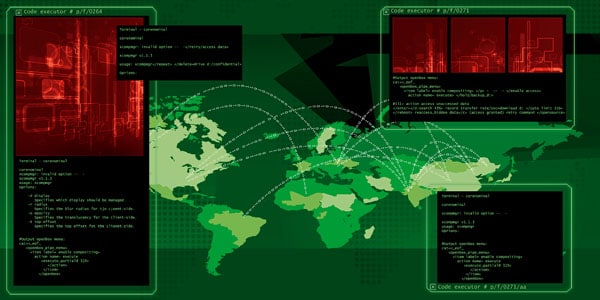
The Cool Maneuvers and Battle On the Net
We are living in the age of the cool maneuvers, a period of intense and sustained virtual struggle on the Internet
... the concept of war has become anachronistic, an outmoded approach.
- H.H. Dalai Lama
In 1957, the Soviet Union launched the first satellite, Sputnik I. It was nothing short of a shock to the US and it had no choice but to retaliate, at least in terms of innovation. President Dwight Eisenhower created the Advanced Research Projects Agency (ARPA) to recapture the technological lead in the arms race. The idea of a national communications network was hatched. It was designed in such a way that if one node was shut down owing to, say, a military strike, the network would stay up and running.
The ARPANET went live in 1969. Over time, universities in the United States and Europe were connected and the Internet became a sort of geeky communications medium with military network development happening quietly on the side.
Then there was a tectonic shift. Tim Berners-Lee, a British scientist, invented the World Wide Web in 1990 and changed the entire playing field. The Web represents the mainstreaming and democratisation of the Internet. As of March 2011, there were over 2 billion Internet users internationally. The Internet is a global communications medium of staggering proportions. It has become an international publishing platform, a marketplace, and a battleground.
But the fruit never falls far from the tree.
Something akin to the Cold War has re-emerged. Only, instead of the US and the Soviet Union it is now the US and China jockeying for position; defining and fighting for zones of influence; forming coalitions of nation states, and non-state actors; and, never quite boiling over.
We are living in the age of the Cool Maneuvers, a period of intense and sustained virtual struggle on the Internet. But unlike the Cold War which was animated by fear of nuclear annihilation, the Cool Maneuvers cannot be attributed to any one event or factor. Broadly speaking the information revolution has restructured society, challenged centrally managed institutions, and empowered individuals. On the Internet anyone can become powerful, and many are attempting to become so.
The threat scenarios for cyberspace are many. Cybercrime is far and away the greatest challenge to individuals through fraud and identity theft. State and corporate sponsored cyber-espionage can rock governments and corporations; some impact has also been generated in this category by cyber-activists, Anonymous being the principle practitioner.
And all of this is causing a great deal of hyperventilation. Breathless editorialists are warning of the dangers of cyberwar and digital Pearl Harbours as if these things could actually happen. The likelihood of some sort of Internet Armageddon is so unlikely that such speculations are better suited to Bollywood backlots than any serious consideration. Remember, the Cold War came about because governments realised after Hiroshima that their countries could not afford a nuclear war. By the same logic, there will be no cyber meltdown.
Just for starters, it is in no one’s interest to shut down the Internet. Cyber-criminals would do everything to keep it up and running — it’s their bread and butter. Governments need the Net to conduct cyber-espionage as do corporate players and cyber-activists. Anything other than a well-functioning Internet would be counter-productive. The entire objective is to steal sensitive data and monitor one’s political opposition.

Infographics: Vivek L. Shinde
But in a bait and switch act, governments are using the public’s fear of cybercrime and cyberwar to extend their controls over the Internet, a technology that was designed to prevent it in the first place.
Internet ‘kill switches’ are being furiously worked towards from Egypt to the US; UK wants to be able to monitor and control social networks; Danish police want to end online anonymity.
Most international governments appear to be moving to the model already prevalent in China: An Internet that is used more as a surveillance network, propaganda tool, and to control dissent. And it should be noted that China is now exporting censorship and surveillance technologies to dictators and despots around the world.
But it’s not just censorship and surveillance at which China excels. It has become a grandmaster of cyber-espionage, thieving corporate and government secrets at an alarming rate. And dirty tricks?
Last year, a Chinese telecom company ‘accidentally’ re-routed 15 percent of the world’s Internet traffic through its own servers. Official explanations of the accident reached comic proportions.
Virtual conflict extends the notion of war and requires a perceptual shift. Heretofore war was the business of nation states. It required large and well-provisioned armies and a great deal of effort to see war through. The Internet has changed all of that. It is now possible for an army of one to have a significant impact on the state of the Internet. And the troops are not necessarily all soldiers. Virtual conflict is more properly referred to as information war (infowar), essentially an umbrella term.
It is comprised of cyberwar, involving state actors, and netwar, involving non-state actors. The latter category is comprised of cyber-criminals and terrorists, and increasingly hacktivists who use technology to improve human rights. Infowar is a large and contradictory mix.
Theoretically, cyberwar is possible. Information security experts, politicians, and military strategists all say so. But what they fail to agree on is that one has actually happened. While the widely publicised Stuxnet malware was an innovative event — a kind we may see more of in the future — it was cyber-espionage. And thanks to it being unmasked and thoroughly analysed, security professionals are a step ahead, taking precautions to deflect similar probes in future.
The only countries capable of mounting true cyberwar are the nuclear powers. Not only is it difficult to project with certainty the outcome of a virtual assault. The fear of retaliation and those uncertainties also weigh on the equation. And of course there is the physical response with which to contend. A nuclear power would never enter into virtual conflict with another nuclear power. Espionage, yes. Knocking out a communications grid, never. A cyber-assault would be interpreted as the precursor of a physical war. Bombs would follow. Cyberwar at this level will not be happening. As with the Cold War, the Cool Maneuvers will generate heat but not cause a conflagration.
Canadian-born Oxblood Ruffin is a long time and old school hacker and member of the hacker group Cult of the Dead Cow (cDc). Ruffin is also a ‘hactivist’, a term he helped define, meaning the use of hacking as a tool for political protest.
(This story appears in the 30 November, -0001 issue of Forbes India. To visit our Archives, click here.)





